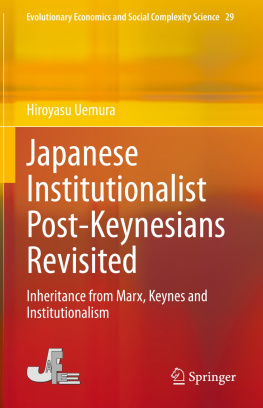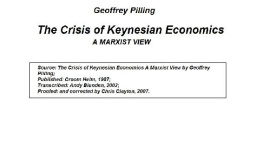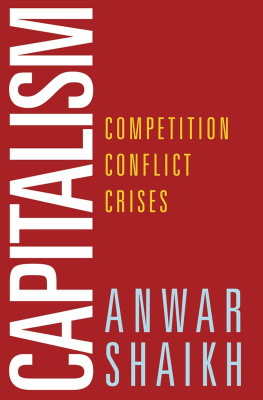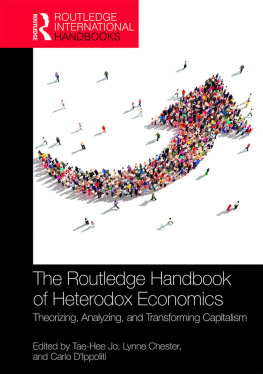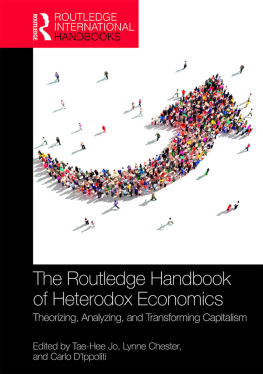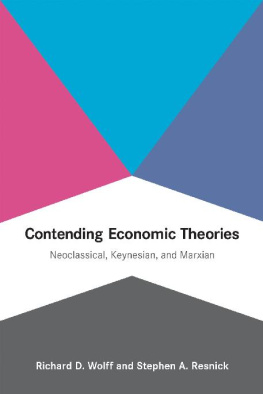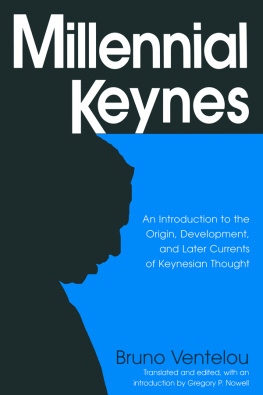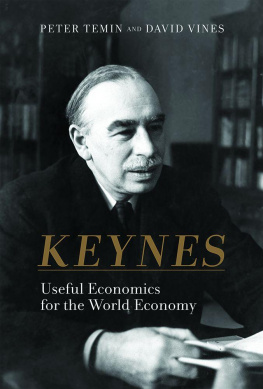THE OXFORD HANDBOOK OF
POST-KEYNESIAN ECONOMICS
VOLUME 2
CRITIQUES AND METHODOLOGY
Edited by
G. C. HARCOURT
and
PETER KRIESLER


Oxford University Press is a department of the University of Oxford.
It furthers the Universitys objective of excellence in research, scholarship, and education by publishing worldwide.
Oxford New York
Auckland Cape Town Dar es Salaam Hong Kong Karachi
Kuala Lumpur Madrid Melbourne Mexico City Nairobi
New Delhi Shanghai Taipei Toronto
With offices in
Argentina Austria Brazil Chile Czech Republic France Greece
Guatemala Hungary Italy Japan Poland Portugal Singapore
South Korea Switzerland Thailand Turkey Ukraine Vietnam
Oxford is a registered trademark of Oxford University Press
in the UK and certain other countries.
Published in the United States of America by
Oxford University Press
198 Madison Avenue, New York, NY 10016
Oxford University Press 2013
All rights reserved. No part of this publication may be reproduced, stored in a retrieval system, or transmitted, in any form or by any means, without the prior permission in writing of Oxford University Press, or as expressly permitted by law, by license, or under terms agreed with the appropriate reproduction rights organization. Inquiries concerning reproduction outside the scope of the above should be sent to the Rights Department, Oxford University Press, at the address above.
You must not circulate this work in any other form
and you must impose this same condition on any acquirer.
Library of Congress Cataloging-in-Publication Data
The Oxford handbook of post-Keynesian economics / edited By G.C. Harcourt and Peter Kreisler.
p. cm.
Includes bibliographical references and index.
ISBN 9780195390766 (v. 1, cloth : alk. paper) ISBN 9780195390759 (v. 2, cloth : alk. paper) 1. Keynesian economics. 2. EconomicsHistory20th century. 3. EconomicsHistory21st century.
I. Harcourt, Geoffrey Colin. II. Kreisler, Peter.
HB99.7.O94 2013
330.156dc23
2012036948
1 3 5 7 9 8 6 4 2
Printed in the United States of America
on acid-free paper
CONTENTS
Preface
Contributors
Introduction
G. C. HARCOURT AND PETER KRIESLER
1. On the Microfoundations of Macroeconomics
S. ABU TURAB RIZVI
2. Post-Keynesian Economics, Rationality, and Conventions
THOMAS A. BOYLAN AND PASCHAL F. OGORMAN
3. Methodology and Post-Keynesian Economics
SHEILA DOW
4. Post-Keynesian Perspectives on Some Philosophical Dimensions of Keyness Economic Thinking
GAY MEEKS
5. Two Post-Keynesian Approaches to Uncertainty and Irreducible Uncertainty
ROD ODONNELL
6. Interdisciplinary Applications of Post-Keynesian Economics
WYLIE BRADFORD
7. Post-Keynesian Economics, Critical Realism, and Social Ontology
STEPHEN PRATTEN
8. The Traverse, Equilibrium Analysis, and Post-Keynesian Economics
JOSEPH HALEVI, NEIL HART, AND PETER KRIESLER
9. A Personal View of Post-Keynesian Elements in the Development of Economic Complexity Theory and Its Application to Policy
J. BARKLEY ROSSER JR.
10. How Sound Are the Foundations of the Aggregate Production Function?
JESUS FELIPE AND J. S. L. MCCOMBIE
11. Marx and the Post-Keynesians
CLAUDIO SARDONI
12. Macroeconomics and the L-Shaped Aggregate Supply Curve
JAMES FORDER
13. A Post-Keynesian Perspective on the Rise of Central Bank Independence: A Dubious Success Story in Monetary Economics
JRG BIBOW
14. The Post-Keynesian Critique of the Mainstream Theory of the State and the Post-Keynesian Approaches to Economic Policy
RICHARD P. F. HOLT
15. A Modern Kaleckian-Keynesian Framework for Economic Theory and Policy
PHILIP ARESTIS AND MALCOLM SAWYER
16. Post-Keynesian Principles and Economic Policies
HEINRICH BORTIS
17. Post-Keynesian Distribution of Personal Income and Pay
JAMES K. GALBRAITH
18. Environmental Economics and Policy
NEIL PERRY
19. Theorizing about Post-Keynesian Economics in Australasia: Aggregate Demand, Economic Growth, and Income Distribution Policy
J. W. NEVILE AND PAUL DALZIEL
20. The Neoclassical Sink and the Heterodox Spiral: Why the Twin Global Crisis Has Not Transformed Economics
GARY A. DYMSKI
21. Keynesianism and the Crisis
LANCE TAYLOR
Index
PREFACE
THE gestation period of this two-volume Handbook on Post-Keynesian Economics is approaching five years. G. C. H. was asked by Michael Szenberg and Lall Ramrattan, the consulting editors of this series of handbooks with Oxford University Press, in the second half of 2007 to be a general editor of the volumes on post-Keynesian economics. He subsequently asked P. K., who was already commissioned to contribute chapters, to join him as joint editor in the first half of 2010. It was soon decided that two volumes would be needed as nominated contributors responded by saying yes. Inevitably, with such a wide-ranging project, some of those asked either declined immediately for good reasons or, also for good reasons, subsequently had to withdraw. Others gallantly came in, often well into the gestation period, to fill the gaps created. To all our contributors we offer a heartfelt thank-you.
The contributions themselves, though all are characteristic of their respective authors distinctive styles, are ideal for a handbook: they are comprehensive and clearly, excitingly, and engagingly written, and they point the way forward to future developments. While there were times when the thought herding cats did cross our minds, overwhelmingly it has been a rewarding and pleasant task cooperating with our contributors, who are either old and trusted dear friends or welcome new ones.
We are much indebted for outstanding expert help with emails and typing (for the computer illiterate G. C. H.) to Janet Nurse, Jane Starnes, Grace Setiawan, and Viet Ha Ngyuen.
More than ever, G. C. H. is indebted to Joan Harcourt for her love, support, and understanding about what he has promised to be the last large project he will ever undertake.
P. K., while not prepared to make a similar promise, is, as ever, indebted to Teresa Kriesler for her love and support during this project, without which it would not have been much fun.
G. C. H. and P. K.
School of Economics,
University of New South Wales
April 2012
CONTRIBUTORS
Philip Arestis is Director of Research, Cambridge Centre for Economics and Public Policy, Department of Land Economy, University of Cambridge, UK; Professor of Economics, Department of Applied Economics V, University of the Basque Country, Spain.
Jrg Bibow is Associate Professor of Economics at Skidmore College, Saratoga Springs, New York, and Research Associate at the Levy Economics Institute, Annandale-on-Hudson, New York.
Heinrich Bortis is Professor of Political Economy at the Faculty of Economics and Social Sciences of the University of Fribourg, Switzerland.
Thomas A. Boylan is Personal Professor of Economics in the J. E. Cairnes School of Business and Economics at the National University of Ireland, Galway.


